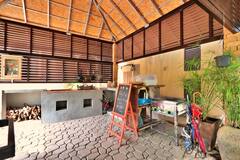You may have heard about Songkran already, the celebrations for traditional Thai New Year, but it really is a festival that has to be experienced to be believed! Famous for its energetic water fights with old and young alike joining in, many travellers journey to Thailand each year purely to experience this vibrant three-day holiday.
The nation grinds almost to a halt, with many people returning to their hometowns to join in with the country’s largest and most popular festival. Travellers can experience the mayhem and merriment of Songkran all around Thailand.
Popular tourist hotspots, such as Bangkok, Chiang Mai, and Phuket, really go wild! With massive street parties, water fights galore, the omnipresent cocktail buckets and bottles of beer, booming music stages, and often impenetrable crowds, the pumped-up vibe is indescribable.
You can have just as much fun though, arguably more so, in some of the more provincial towns and off-the-beaten-track destinations around the country. See a side of the festivities away from the tourist masses and observe traditional rituals and various regional customs. Really join in with the lively local festivities and feel the heart and soul of Thai New Year.
A little bit of history behind the Songkran festivities: How did it all begin?

The traditional Thai New Year originally followed the Buddhist calendar, with astrologers setting the dates each year so as to coincide with when the sun entered the sign of Aries. The date was eventually fixed, with Songkran now celebrated between the 13th and 15th of April each year. The festivities may last for longer in some areas, with Chiang Mai being a notable example – Songkran lasts for a week in the cultural northern city.
Traditional rituals include cleaning the home, preparing and offering food to monks, visiting the temple, washing Buddha statues, and paying respect to elders. The water used to clean the Buddha statues is kept to gently pour over older family members. This symbolises cleansing in preparation for the year ahead, and is thought to bring good fortunes and health to the elders.
The pouring of water gradually evolved into a giant water fight!
If you visit a temple during Songkran you’ll notice that people still ritually clean Buddha statues and collect the runoff water. It is also fairly common for large Buddha statues to be paraded around the streets in the back of decorated pickup trucks.
Jump in the back of a pickup truck with essential supplies!

Forget roaming the streets with a water pistol; fill a huge container with water, throw in a giant block of ice for good measure, grab a few plastic buckets, and you’re good to go.
Many people head to the streets in pickup trucks, stopping to play with others on the side of the road and slowing to engage in a watery battle with other vehicles.
You’ll come across lively (and wet!) street parties, with music blaring and people dancing in the street and having heaps of fun. Don’t be afraid to join in! Overhead sprinklers are used in many places, and you may even come across fire engines that are happily part of the water throwing fun.
Replenish supplies as you go

Sooner or later your water supply is going to run out. No problem at all! Simply pull over and refill. Be prepared to get even wetter in the process though!
Some people join in with the Songkran water fights from right outside their home or business. They fill large containers with water to throw over passing vehicles and pedestrians, and might also give people a soaking using a hose pipe. With all the fun of Songkran, most people are more than happy for you to stop and refill your vats, pausing for a while to drench and be drenched.
You might be interested in these Airbnbs!
Embrace the lucky gloop

It is very common for people to smear a thick pasty substance on others, usually on the face. Made by mixing a chalky powder with a small amount of water, the resulting goo is another traditional way of wishing people good luck and fortunes for the following twelve months ahead. It originated from the practice by monks of using chalk to bestow blessings on people. Strangers now jovially daub others during Songkran, and it’s quite normal to see the residue splashed over cars and the streets. Be wary of getting it in your eyes – it can sting quite a bit!
Watch elephants joining in with celebrations

If you spend Songkran in a town or city that is known for having (captive) elephants, it is more likely than not that the mahmouts (elephant trainers and handlers) will proudly ride the magnificent creatures out onto the streets to join in with the escapades. The elephants have often been decorated with colourful images and messages.
Watch as elephants fill their trunks with water before discharging it all over the nearby crowd. Young children often delight in spraying the elephants, and the mahmouts jig with glee whilst perched on the elephants’ necks. Some of the best places to see elephants joining in with the revelry include Ayutthaya, Chiang Mai, and Surin.
Tips for enjoying Songkran
Whilst Songkran is heaps of fun, it is also the period when Thailand sees the highest number of road accidents, with many casualties and some fatalities every year. If you are driving yourself, don’t drink alcohol. Don’t accept a ride from a drunk driver, and pay even greater attention on the wet and slippery roads. Although you will see people joining in the fun on scooters, don’t throw water at a moving scooter or motorbike.
Keep all of your valuables in waterproof bags or, even better, inside a vehicle. You will get very wet! Don’t get annoyed if the water is freezing cold – many people put ice in their water for an even bigger shock! Don’t throw ice though, just throw water.
If you’re really not interested in taking part, stay away from the larger cities and towns, like Bangkok, Phuket, Pattaya, and Chiang Mai. Or, hole up indoors for a couple of days! The celebrations there attract many tourists and have become quite commercialised. Elsewhere, however, the majority of revellers accept that not everyone wants to get soaked. Simply indicate that you’re not playing, perhaps with a nod to a bag, and you should be fine. It’s also important if you are part of the action to respect others who do not want to get wet! If someone is walking along a street carrying shopping bags and they are bone dry, don’t be that person who ruins their day!
Book your April trip to Thailand and experience the sheer joy of Songkran.
History
Get Trip101 in your inbox
Unsubscribe in one click. See our Privacy Policy for more information on how we use your data




















Create an account to